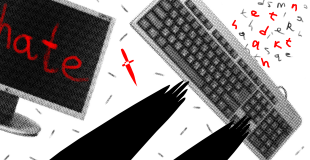
The review reflects the main trends in the use of markers “extremism” and “terrorism” in Belarus from October to December 2022. We investigate the publications of state media, pro-government Telegram channels, independent media and human rights organizations. This review does not cover the analysis of the practice of using separately “protest” (“mass riots,” “actions grossly violating public order”) and most of “defamatory” (crimes related to “insult” and “slander” against representatives of the regime) articles of the Criminal Code, which are also part of the “anti-extremist” legislation.
State bodies and state media continued to use “extremism” as an instrument of political pressure and persecution of civil society representatives. Legislation is becoming increasingly repressive: the death penalty can now be applied to civil servants and the military who are accused of treason; parliament is discussing criminal liability for discrediting the army and promoting terrorism; the authorities introduced a ban on the activities of tour guides convicted for “political” reasons; “incitement of enmity” can become a new basis for banning the activities of parties and public associations.
For three months, we know of at least 129 new criminal cases, 89 sentences, and 127 cases of administrative offenses on “extremist” grounds, not counting cases related to “protests” and “insults”. During the analyzed period, the maximum recorded punishment for “extremism” is 25 years in prison. Also, covering one of the detentions of a man for “extremist comments,” the security forces said that “the result of his activities” was the initiation of 58 criminal cases at the same time.
The analyzed period was marked by the first trials in absentia of opposition representatives who were abroad, followed by the confiscation of their property. The deanonymization of civil servants is increasingly equated with “inciting social enmity”. Detentions resumed for comments on the death of civil servants. There is a wave of convictions on charges of “calling for causing harm to national security” against labor union activists who called for disobedience to the authorities at state-owned enterprises. For the first time, a verdict was passed for an interview with “extremist” media under an article on “aiding extremism”. The attention of the security forces to the Belarusian paramilitary units created abroad in the framework of accusations of “creating an extremist formation” is increasing. The courts continued to issue extremely harsh sentences against people who carried out resistance actions to destroy state property or the property of government officials – all such actions were interpreted as “terrorist activities”. The moderation of social networks of opposition organizations recognized as “terrorist” began to be interpreted by the security forces as “participation in a terrorist organization,” and people who gave information to Belarusian organizations located abroad began to be punished for “treason against the state”.
An increase in the practice of criminal punishment for the dissemination of Nazi symbols, including in the form of tattoos, has been recorded. For the first time, the opposition motto was included in the List of Nazi Symbols − the slogan “Long live Belarus!”. Punishments for subscribing to opposition resources have ceased to be isolated precedents and have become a part of repressive practices on an ongoing basis. The courts began to recognize postal parcels, podcasts on streaming platforms, Telegram chats of Belarusian diasporas, Ukrainian patriotic songs as “extremist materials,” and for the first time a non-profit organization was added to the list of “extremist formations”. The latest up-to-date updates of all “extremist” lists can be found in the specialized Telegram channel “Who is today?”.
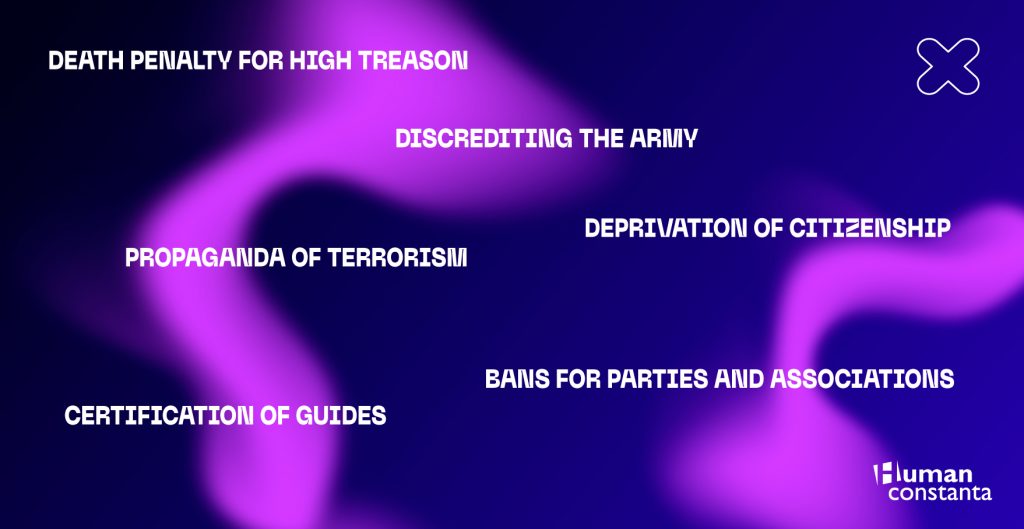
Содержание
- 0.1 Legislative changes
- 0.2 “Extremism” and the war in Ukraine
- 0.2.1 2.1. Criminal cases related to Belarusian units fighting on the side of the Armed Forces of Ukraine
- 0.2.2 2.2. Persecution for condemning Russian aggression on social media
- 0.2.3 2.3. Cases of “acts of terrorism” for damaging railroad tracks
- 0.2.4 2.4. The transfer of information about Russian troops was equated with the “aiding extremism”
- 0.2.5 2.5. Ukrainian songs are recognized as “extremist materials”
- 0.3 Criminal proceedings
- 0.3.1 3.1. Article 130 of the Criminal Code “Inciting racial, national, religious or other social enmity or discord”
- 0.3.2 3.2. Article 130-1 of the Criminal Code “Rehabilitation of Nazism”
- 0.3.3 3.3. Article 191 of the Criminal Code “Obstruction to the exercise of electoral rights, process of holding elections and referenda, work of the Central Electoral Commission”
- 0.3.4 3.4. Article 289 of the Criminal Code “Act of terrorism”
- 0.3.5 3.5. Article 290-4 of the Criminal Code: “Creation of an organization for carrying out terrorist activities or participation in it”
- 0.3.6 3.6. Article 290-5 of the Criminal Code “Organization of the activities of a terrorist organization and participation in its activities”
- 0.3.7 3.7. Article 356 of the Criminal Code “High treason”
- 0.3.8 3.8. Article 357 of the Criminal Code “Conspiracy or other actions committed with the aim of seizing state power”
- 0.3.9 3.9. Article 361 of the Criminal Code “Calls for restrictive measures (sanctions), other actions aimed at causing harm to the national security of the Republic of Belarus”
- 0.3.10 3.10. Article 361-1 of the Criminal Code “Creation of an extremist formation or participation in it”
- 0.3.11 3.11. Article 361-2 of the Criminal Code “Financing of extremist activities”
- 0.3.12 3.12. Article 361-4 of the Criminal Code “Aiding extremist activities”
- 0.3.13 3.13. Article 369-1 of the Criminal Code “Discrediting the Republic of Belarus”
- 0.4 Cases on administrative offenses
- 0.4.1 4.1. Article 19.10 of the Code of Administrative Offenses “Propaganda or public demonstration, production, distribution of Nazi symbols or paraphernalia”
- 0.4.2 4.2. Article 19.11 of the Code of Administrative Offenses “Distribution, production, storage, transportation of information products containing calls for extremist activity or promoting such activity”
- 1 Changes in the Republican List of Extremist Materials
- 2 Changes to the List of Organizations, Formations, Individual Entrepreneurs Involved in Extremist Activities
- 3 Changes in the List of Nazi Symbols and Paraphernalia and the List of Organizations and Other Structures Specified in Paragraph Three of Part One of Article 1 of the Law of the Republic of Belarus “On Preventing the Rehabilitation of Nazism”
- 4 Changes in the List of Citizens of the Republic of Belarus, Foreign Citizens or Stateless Persons Involved in Extremist Activities
- 5 Changes to the List of Organizations and Individuals Involved in Terrorist Activities
- 6 Disbandment of organizations, website blocking, and preventative flagging for “extremism”
Legislative changes
The Belarusian authorities continue to use the rule of law as a repressive tool to oppress, intimidate and persecute dissidents. From October to December 2022, we recorded 4 legislative changes that are directly or indirectly related to “extremism”.
On December 7, 2022, the House of Representatives in the first reading adopted the bill “On Amending the Codes on Criminal Liability,” introducing new categories of “extremist” crimes into the Criminal Code, as well as expanding the grounds for applying the death penalty. In particular, the draft law provides for the introduction of the death penalty for high treason (Article 356 of the Criminal Code) committed by an official holding a public position or a person covered by the status of a military man. The press service of the body notes that these measures are proposed for the purpose of “deterrent effect on destructive elements”. Obviously, the amendments will be used to intimidate government officials in order to prevent their interaction with opposition structures located abroad, as well as to counteract any form of disloyalty. The bill also introduces changes directly related to the preparation of the regime for a possible armed conflict. Thus, the document introduces an amendment to the disposition of Article 369-1 of the Criminal Code (“Discrediting the Republic of Belarus”) in order to establish responsibility for the dissemination of deliberately false information that discredits the Armed Forces, other troops and military formations, paramilitary organizations of the Republic of Belarus. These changes will become the basis for “military censorship” in the event of both a civil or interstate armed conflict involving Belarusian troops, as well as expand the possibilities of repression for criticizing the actions of the security agencies (similar changes to establish responsibility for “discrediting the army” were made in the Russian Federation a few days after the start of the aggression against Ukraine). Finally, the draft Law of the Criminal Code is supplemented by Article 289-1 “Propaganda of terrorism,” which is likely to be used to limit information about cases and methods of forceful confrontation with the authorities, almost all of which are interpreted by the security forces as “terrorist activity”.
On December 7, 2022, the Council of Ministers adopted Decree No. 839, which introduces a ban on professional certification of guides and guide-interpreters convicted under “protest” and “defamation” articles of the Criminal Code, as well as for “incitement of enmity,” “conspiracy,” “calls to harm national security,” and other “extremist” crimes. A ban on attestation was also introduced for people who were tried under the “political” articles of the Code of Administrative Offenses, in particular for the distribution of “Nazi symbols” and “extremist materials” (Articles 19.10 and 19.11 of the Code of Administrative Offenses), and also for “violating the procedure for organizing mass events” (Article 24.23 of the Code of Administrative Offenses) and other offenses. The document is aimed at suppressing the interpretation of historical and political events that is objectionable to the regime and removing obstacles to the further spread of propaganda.
On December 14, 2022, the House of Representatives adopted in two readings a bill to amend the law “On Citizenship of the Republic of Belarus,” which will allow depriving Belarusians of citizenship, even if they acquired it by birth. The grounds for deprivation of citizenship are a sentence confirming the participation of a person in “extremist activity” or causing “grievous harm to the interests of the Republic of Belarus,” as well as the fact that the accused person is abroad. The law explains that a term “extremism” will be interpreted within the list of crimes from 55 articles of the Criminal Code. You can learn more about this bill in our previous review.
On December 20, 2022, the deputies adopted in the second reading a draft law on state statistics, which allows limiting the dissemination of statistical data in case of a threat of harm to the national security of the country.
On November 22, 2022, Deputy Minister of Justice Oleg Kot spoke about the upcoming changes to the legislation on public associations and political parties. For parties and associations, a ban will be introduced on propaganda of social, national, religious or racial enmity, as well as on terrorist and other activities prohibited by law or allowing the possibility of their implementation. Also, the relevant draft law “will correct restrictions related to the name and symbols of a political party – they should not serve the purpose of propagating war, terrorist, extremist, and other prohibited activities or allowing for the possibility of their implementation”. One of the grounds for the liquidation of the relevant organizations will be the inconsistency of their activities with the main directions of domestic and foreign policy, as well as the National Security Concept. Given the extremely broad legislative interpretations of terms related to “extremism” and “terrorism,” these innovations are very likely to be used to put pressure on civil society in Belarus, restrict the right to freedom of association, and support only “pro-government” activism
“Extremism” and the war in Ukraine
This is the fourth review in which we record incidents related to Russian aggression in Ukraine with the support of the Belarusian authorities. We continue to record the use of “anti-extremist” legislation to prosecute those who are against the war and the involvement of Belarus in military actions.
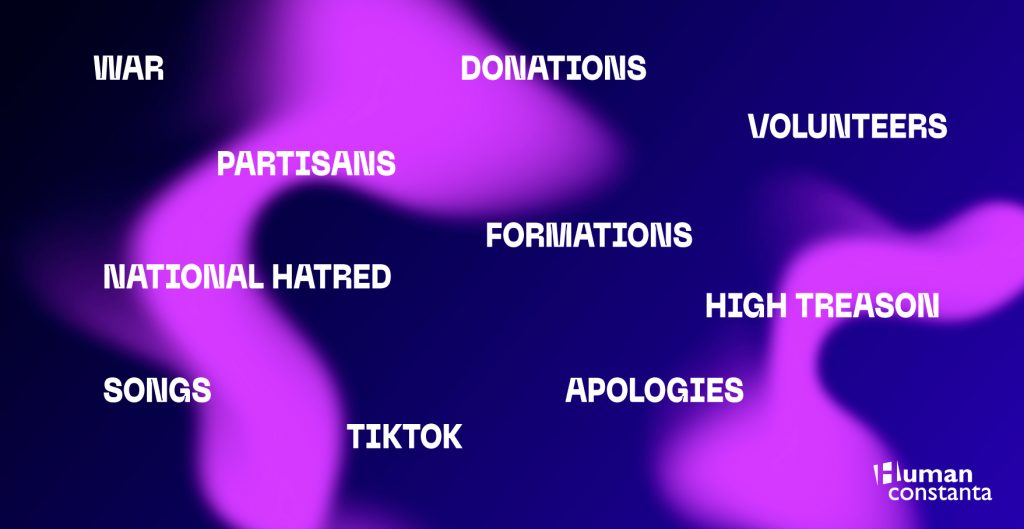
The analyzed period is marked by increased attention to the Kalinovsky Regiment military detachment, which is part of the Armed Forces of Ukraine (AFU), and which is often called “terrorist” in pro-government sources. Pressure on the Regiment is carried out in various formats: the initiation of criminal cases against the fighters of the unit and their relatives, the persecution of potential volunteers, the suppression of any material assistance.
On October 11, 2022, the Investigative Committee opened a criminal case against the creators and participants of the Kalinovsky Regiment under Article 361-1 of the Criminal Code (“Creation of an extremist formation or participation in it”). According to investigators, Belarusians from foreign diasporas decided to create this unit “inspired by the ideas of nationalism and following the patterns of the chauvinist ideology of the armed groups of the neighboring country”. In the reports of state bodies, members of the unit are called “mercenaries” for propaganda purposes, despite the fact that the Regiment is a structural unit of the regular troops of Ukraine, and the unit itself appears in the reports of the security forces as a “Nazi formation”. On November 4, 2022, a criminal case was initiated against another Belarusian unit, this time against opposition leader Vadim Prokopiev and “other persons” for creating the Pagonya regiment and participating in its activities.
There are three new cases of detentions of people who registered in the Regiment’s chatbots and expressed a desire to join it. On October 22, 2022, information appeared about the detention of a resident of Homel, who registered as a volunteer, but then changed his mind about taking any practical actions. On November 8, 2022, the state TV channel STV aired a story about the detention of five potential volunteers by employees of the State Security Committee (hereinafter referred to as the KGB). The program states that “all of them were detained brutally, if you like – harshly”. Also, a resident of Astravets was detained for trying to join the Ukrainian battalion “Azov” in 2020 and the Belarusian unit “Terror” in 2022, also fighting on the side of the AFU.
The period was also marked by 2 sentences: a resident of Minsk was sentenced to 4 years in prison for contacting representatives of the Regiment, and a resident of Gomel was sentenced to 2 years and 1 month in prison for attempting an unauthorized crossing of the border with Ukraine in order to participate in the armed conflict in Ukraine. Reprisals against potential volunteers are carried out under Article 361-3 of the Criminal Code (“Participation on the territory of a foreign state in an armed formation or armed conflict, military operations, recruitment or training of persons for such participation”). It should be noted that only people who wish to participate in the war in Ukraine on the side of the AFU are being persecuted. Information about criminal cases against Belarusians fighting on the side of the Russian Federation has not been recorded.
There was information about the first detentions for material assistance to the Regiment. On October 24, 2022, with the support of the Special Purpose Mobile Unit (OMON), a resident of Gomel was detained – she sent a donation to Regiment’s account. She was charged under Article 361-2 of the Criminal Code (“Financing of extremist activities”).
Pressure on the relatives of the active fighters of the unit has intensified. It is known about the detention of the brother of the deceased volunteer Vasily Parfyankov for subscribing to “extremist channels,” and about a search in the house of the mother of the deceased soldier with the call sign “Volat,” which was accompanied by a complete destruction of the place of residence. Later, a criminal case was initiated against the woman under Article 361-4 (“Aiding extremist activity”) for “filling Regiment’s Internet resources with content, and also giving an interview to the “extremist” channel Belsat.
The practice of criminal prosecution for “inciting national enmity” against people who criticize the actions of the Russian Federation on the territory of Ukraine on the Internet, as well as leaving negative comments about Russian military personnel and officials or about Russians in general, is expanding. In total, at least 16 arrests are reported for sharply critical comments on social networks: for example, it is known about persecution for “joy at the death of Russian military personnel,” forwarding posts about the movement of Russian military men condemning their actions, criticism of the leaders of the Orthodox Church supporting the war, comments calling for “burning Pskov,” calls for Ukrainians to strike at Belarusian airfields and other actions. During some detentions, practices degrading the dignity of detainees were recorded:
- a commentator who insulted the head of the Chechen Republic Ramzan Kadyrov was forced to say the motto “Akhmat is strength!” meaning support for Kadyrov;
- another man who criticized the “special military operation” on TikTok was forced to confess to supporting the Russian army and to sing the military song “Victory Day”;
- For a video on TikTok in support of Ukraine, a Minsk resident was forced on camera to ask for forgiveness from the “Slavic brothers” and apologize for “supporting the fascist ideology”.
Repression continues not only for comments, but also for other anti-war actions on the Internet:
- an underage resident of Mogilev was detained for “incitement of enmity” for the fact that in various discussions he sharply asked to distinguish the Belarusian people from the Belarusian regime, and also published pro-Ukrainian slogans;
- 61-year-old resident of Pinsk with a disability was detained for an anti-war repost in Odnoklassniki that contained a drawing of Putin in uniform with Nazi symbols;
- a resident of Mogilev was detained for “like” under anti-war posts on social networks;
- a resident of Braslav was detained for a profile picture on Facebook, which contains the flag of Ukraine;
- in the Mogilev Regional Court, a local resident was sentenced for his anti-war position on the Internet – he was sentenced to 2.5 years in prison for reposting news about Russian aggression and comments condemning Russians who participate in or support the war.
2.3. Cases of “acts of terrorism” for damaging railroad tracks
On November 26, 2022, the Investigative Committee announced the investigation of more than 30 criminal cases under article 289 of the Criminal Code (“Act of terrorism”), including those related to terrorist attacks on railways and roads. The courts continued to issue extremely harsh sentences against the “rail partisans” – people accused of damaging the railway tracks in order to slow down the movement of Russian military equipment through the territory of Belarus. In almost all cases, actions to damage transport routes were interpreted by the security forces as an act of terrorism (Article 289 of the Criminal Code), despite the fact that some of the convicts did not take any practical actions to damage transport routes. None of the cases of track damage caused human casualties or accidents. For three months, 6 sentences were recorded against “partisans”:
- On October 5, 2022, it became known about the verdict against the ex-employee of the Belarusian Railways, a resident of Vitebsk – he was punished with 15 years in prison. According to investigators, he “thought up a plan of a terrorist attack on the railway and was looking for like-minded people among his colleagues, inciting them to commit serious crimes;”
- On October 12, 2022, the Mogilev Regional Court sentenced a resident of Osipovichi to 11 years in prison for “expressing active readiness” to carry out sabotage at railway facilities;
- On October 17, 2022, the Minsk District Court sentenced a resident of Stolbtsy to an identical term of imprisonment, who “under the influence of destructive Telegram channels in order to influence the decisions made by the Belarusian authorities” set a fire on the railway tracks;
- On November 14, 2022, the Lida District Court sentenced a local resident to 3 years in prison for offering to organize sabotage on railway tracks: his actions were interpreted not as an “act of terrorism,” but as “deliberately making a vehicle or means of communication unusable” (article 309 of the Criminal Code);
- On December 22, 2022, another “rail partisan” was sentenced to 15 years in prison on charges of setting fire to a railroad automatic traffic light relay cabinet in order to disable the signaling system. It is known that during the detention the man was shot in the knee joints;
- On December 27, 2022, the Gomel Regional Court sentenced three “partisans” from Svetlogorsk to terms of 21 to 23 years in prison on charges of setting fire to an alarm system on one of the sections of the railway. In addition to the “terrorism” charges, they were also charged with “high treason” (Article 356 of the Criminal Code), since, according to the prosecution, they were instructed to disable the equipment by the opposition organization of former security forces BYPOL, which is located abroad.
2.4. The transfer of information about Russian troops was equated with the “aiding extremism”
Courts continue to issue sentences for sending photographs of military equipment to “extremist” Telegram channels, including the “Belarusian Gayun” channel for monitoring military activity in Belarus.
5 sentences were recorded under Article 361-4 of the Criminal Code (“Aiding extremist activities”) in this context. For example, on October 28, 2022, the Gomel Regional Court sentenced a resident of Zhlobin to 2 years in prison for filming aircraft. The man explained his motives by saying that “he was frightened and thought that a war had begun here”. It is also known about 3 new arrests. For example, a man who was filming military facilities using a drone was detained near one of the military units – based on the fact that the man had previously been detained for participating in protests, the security forces concluded that the man acted precisely for “extremist” purposes.
Also, the period was marked by the second in the history of observations criminal case for the transfer of information of a military nature under article 356 of the Criminal Code (“High treason”) – a resident of Brest was charged with the transfer of data on the location of Russian units and sites for launching Russian military missiles in Belarus. In pro-government stories, the man is referred to as an “agent of the Ukrainian special services,” in connection with which the man is charged with a more serious accusation than is standard practice.
2.5. Ukrainian songs are recognized as “extremist materials”
On November 14, 2022, the Central District Court of Gomel recognized the Ukrainian military-patriotic song “Our Father – Bandera, Ukraine – Mother” as “extremist materials”. It should be noted that the Belarusian propaganda and representatives of the regime consider the Ukrainian politician Stepan Bandera a supporter of the Nazi ideology.
Criminal proceedings
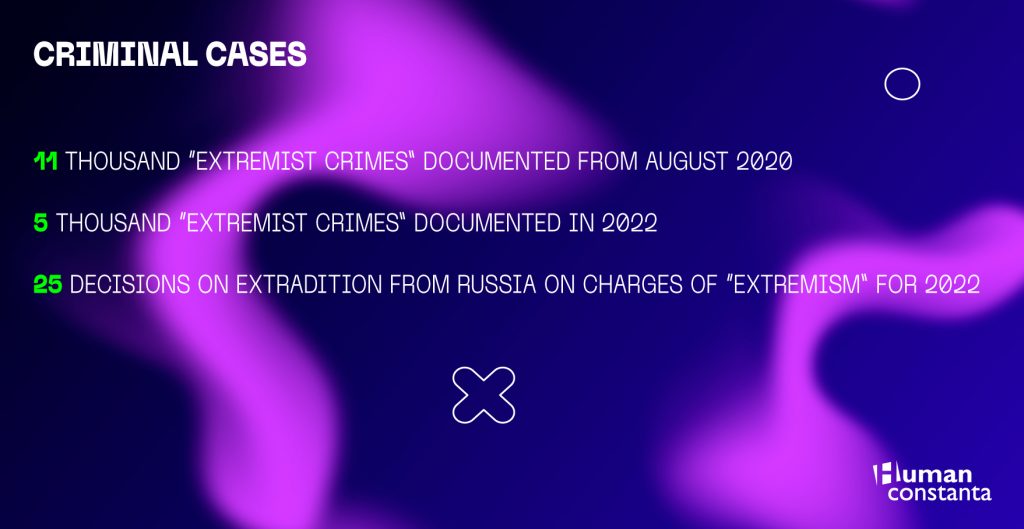
On November 26, 2022, the representative of the Investigative Committee Anatoly Vasilyev stated that since 2020 more than 11,000 “extremist crimes” have been recorded, most of which were committed in the post-electoral period in 2020-2021. In the last analyzed period, the Investigative Committee provided identical statistics.
On December 25, 2022, Prosecutor General Andrey Shved announced statistics on “extremist cases” for 2022. According to him, over the past 11 months, law enforcement agencies have identified more than 5,000 “extremist” crimes, 76% of which were committed on the Internet. Shved also announced close cooperation with the Russian law enforcement agencies in the context of countering “extremism”. In 2022, Russian courts made positive decisions to extradite 25 citizens of Belarus, who were charged with “crimes of an extremist nature”. Also, the Belarusian authorities sent 6 criminal cases to Russia against citizens of this country in order to bring them to justice under Russian law for actions against the Belarusian regime. For example, a resident of Kazan was convicted by a Russian court for insulting a Belarusian police officer.
Chairman of the Investigative Committee Dmitry Gora said that Alexander Lukashenko instructed to focus efforts on completing the investigation of criminal cases of an “extremist orientation” and to reduce the remainder of such cases in production. At the same time, in relation to cases that it is not possible to complete at the moment (probably meaning crimes committed abroad), it was instructed to “accumulate a database, record all illegal acts, so that in the future it would be possible to bring persons who committed these crimes to criminal liability.
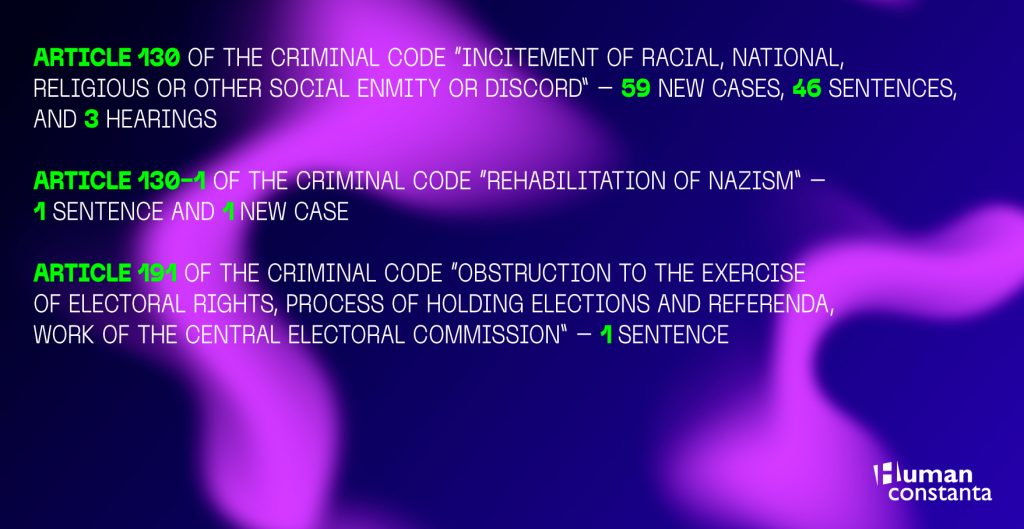
3.1.1. Leaks of personal data of security officials
The analyzed period was marked by a multiple increase in cases of repression against people who sent personal data of civil servants to opposition resources, in particular, to the Black Book of Belarus initiative, which deals with the deanonymization of government officials accused of violating human rights. The repression is intensifying against the backdrop of the publication of information about a Main Directorate for Combating Organized Crime and Corruption (GUBOPiK) agent found in the ranks of the initiative, who managed to gain access to the databases of users who leaked sensitive information. Based on information from both independent media and pro-government sources, it can be argued that the security forces could have accessed the data of 8.500-10.000 people who sent information to the bot. Potentially, each of them can become accused of “inciting enmity”.
Moreover, the security forces claim that they gained access to all the equipment of Sofia Sapieha, who was detained during the forced landing of the Ryanair plane and accused of administering the resources of the Black Book of Belarus, which also helped the security forces to identify people who collaborated with the initiative. The representative of the Investigative Committee Oleg Shandarovich noted that employees of all mobile operators, including officials, bankers, cadastral services specialists, lawyers, as well as former law enforcement officers (who are called “traitors” in state sources) appear in the “leaks” cases.
On December 12, 2022, the Minsk City Court began the first ever consideration of a criminal case within the framework of “special proceedings” (in absentia) against the creators and administrators of the “Black Book of Belarus” – Yanina Sazanovich, Dmitry Navosha, Daniil Bogdanovich, Valeria Zanemonskaya and Olga Vysotskaya, all of them are abroad. Olga Vysotskaya tried to participate in the process against herself remotely, but the court rejected all her requests to participate in the process using videoconferencing and offered to appear at the process in person. Olga also tried to contact the lawyer who was appointed by the state to protect her in this process – the lawyer blocked Olga in the messenger after several attempts to get in touch with him.
For three months, 6 sentences are known under Article 130 of the Criminal Code in this regard. Former investigator Nikita Storozhenko, who resigned from service in protest after the presidential election, was sentenced to 7 years in prison, and former prosecutor Oleg Yermakov was sentenced to 6 years in prison, both for passing on data of former colleagues. The top manager of the Life:) mobile operator was sentenced to 8 years in prison: according to the security forces, the man read channels publishing personal data of civil servants, and, “noticing that many publications contain gaps in the available personal data, he decided that they need to be replenished”. Severe sentences are passed not only for committing mass leaks by people with access to large databases, but also for isolated cases of sending information to a bot – for example, a resident of Minsk was sentenced to 7 years in prison for sending information about his former boss to “destructive channels,” which led to “other grave consequences”. On December 14, 2022, a resident of Novogrudok was sentenced to 2 years in prison for reposting a publication about two employees of penitentiary institutions – the publication contained personal data of the security forces, and the employees themselves were covered in a negative way.
13 arrests were recorded for “leaks,” which occur with particular cruelty on the part of the GUBOPiK employees. It is known about the detention of people of various professions who had access to sensitive data: a person who recognized a security officer classmate in one of the videos and shared his data with Telegram channels; an employee of the Ministry of Finance who “corrected the information of extremists”; two employees of the MTS company from Brest and Minsk, accused of leaking billing information; a system administrator from the Security Department of the Ministry of Internal Affairs (hereinafter referred to as the MIA), as well as employees of state-owned enterprises from Slonim, Minsk and Miory. Separately, it is worth noting the repeated detention of a resident of Minsk, who worked as a postwoman: in 2020, she was detained for transferring the data of security forces subscribed to departmental newspapers, and after serving her sentence in the form of arrest, she was detained again, for “leaking” the personal data of a judge and a prosecutor, who conducted criminal proceedings against her in a previous case.
3.1.2. Comments critical of the security forces
For these three months, we know about 9 sentences for harsh critical comments in messengers and social networks against government officials and law enforcement agencies as a whole group. Charges are brought for criticism of both Belarusian and Russian security officials. Such messages are interpreted by the security forces as “incitement of other social enmity,” while charges are most often brought together with “defamatory” articles of the Criminal Code. Almost all cases are held behind closed doors, and government agencies publish reports of court hearings using extremely vague excerpts from the law, and therefore the specifics of most cases remain unknown.
One of the few trials about which details are known was the trial of a resident of Mozyr – the Gomel Regional Court sentenced her to 2.5 years in prison for negative comments on Instagram about the police (for example, “It is a well-known fact that militia is worse than shit,” “a good cop is a dead cop”). The maximum term of imprisonment for comments on this article for the analyzed period is 7 years in prison. Also, on December 30, 2022, a citizen of Latvia was sentenced to 4 years in prison for messages condemning the Lukashenko regime on his phone, “which the security forces did not like”.
21 new criminal cases were also recorded. Most of them are associated with expressing a negative opinion about the security forces, however, we recorded arrests for negative opinions towards school workers who participated in falsifications during the presidential elections, or towards members of the pro-government “military-patriotic” club “Lynx”. On December 27, 2022, it became known that GUBOPiK employees were checking statements of comedian Andrey Skorokhod – he was accused of inciting enmity, including against “an ordinary patriot woman who came to support the security forces in difficult times”. Separately, it is worth noting the detention of a Belarusian who is accused of writing 43.000 “extremist comments” – according to pro-government sources, 58 criminal cases were simultaneously initiated against him.
The persecution of independent journalists continues for disseminating information objectionable to the regime. On October 26, 2022, the Minsk City Court sentenced Sergei Satsuk, editor-in-chief of the Ezhednevnik publication, to 8 years in prison for inciting enmity, as well as on the basis of various economic articles of the Criminal Code. On the same day, a criminal case was initiated against Dmitry Semchenko, a former journalist of the state channel ONT, based on “a text that the expert commission considered inciting enmity against police officers” found under his post on the social networks. On November 9, 2022, GUBOPiK officials detained a state media worker for participating in writing articles for an opposition publication in the past.
More severe sentences are usually passed to those convicted of inciting enmity coupled with “protest” articles of the Criminal Code. Usually, the most radical comments containing calls for violent resistance fall under this set of accusations. 4 such sentences were recorded:
- On October 3, 2022, a taxi driver from Lida was sentenced to 9 years in a penal colony for “messages containing interest or readiness to create armed associations” (for example, “Molotov cocktails can solve many problems”);
- On October 5, 2022, the Brest Regional Court sentenced a Minsker to 4 years in prison for calling for violence against employees of the internal affairs bodies, as well as for calls to “create traffic jams, sabotage work and protest;”
- On October 19, 2022, a resident of Slonim was sentenced to 7.5 years in prison for comments about the need for a strike, the closure of enterprises and the resumption of protests; as well as for calls to “remove the epaulettes from the security forces”; and for negative opinion about the protests in Kazakhstan and the Belarusian peacekeeping contingent in this country;
- On November 16, 2022, a Grodno resident was sentenced to 9 years in prison under 9 articles of the Criminal Code, including for “participation in destructive chats,” in which the man “called for violence against law enforcement officers” (the prosecution requested a sentence of 16 years imprisonment).
It is also known about arrests for calls to “burn the security forces with Molotov cocktails”, as well as for proposals to “surround the security officials,” “puncture tires,” “shoot with fireworks”.
3.1.3. “Zeltser case”
As part of the Zeltser case, the courts continued to pass sentences under articles 130 of the Criminal Code and 369 of the Criminal Code (“insulting a government official”) for insulting comments about the murdered KGB officer Dmitry Fedosyuk. In three months, 26 sentences are known for negative comments on the Internet in which people spoke about this incident. On average, people are punished with imprisonment for a period of 2 to 3 years, the maximum term in this case is 6.5 years in prison for the total number of articles.
Most of the processes were held behind the closed doors; details are known only about a few processes. On October 21, 2022, the Moscow District Court of Brest punished a local resident for the comment “The man shot a bandit who broke into his apartment”. On October 24, 2022, another resident of Brest was convicted for the comment “This is how these regime creatures need to get it. Feel sorry for the guy” – the prosecution considered that this comment could “cause an outbreak of violence against law enforcement officials”. On October 28, 2022, an ex-journalist from Baranovichi was sentenced to 3 years in prison for a comment in which he called the deceased employee a “dog” and added that the security forces would continue to die if they “continue to come to the apartments of honest Belarusians” – according to investigation, the commentary contains “statements aimed at building up anti-state sentiments, approval and propaganda of violent resistance to law enforcement officers of the Republic of Belarus”.
3.1.4. Cynical comments about the deaths of other government officials
On November 30, 2022, pro-government sources stated that the GUBOPiK employees identified more than 20 people in Belarus and 50 people abroad, who, in “destructive hysteria,” decided to insult the memory of Foreign Minister Vladimir Makei, who died suddenly on November 26, 2022. Telegram channels close to the security forces noted that all these individuals “will inevitably be detained and deprived of liberty”. Later, “repentance videos” of at least 4 detainees were published in pro-government channels, in which they admitted to leaving cynical comments about Makei’s death. For example, one of the people was detained for commenting “Again the wrong one” under a post about Makei’s death.
3.1.5. Other
On December 21, 2022, pro-government journalist Ksenia Lebedeva, on the air of the state TV channel Belarus 1, criticized the fresco “Miracle on the Vistula”, located in the Church of the Blessed Virgin Mary of the Rosary in the Smorgon district. The fresco depicts the Battle of Warsaw in 1920 during the Soviet-Polish war, in which the Soviet regime, at one time, suffered a defeat. According to Lebedeva, the picture “calls for inciting national and religious enmity”. According to the rector of the temple, the employees of the district executive committee demanded that this fresco be painted over.
Russian government agencies continued to cooperate with tfhe Belarusian security forces in the context of the extradition to the Belarusian regime of people accused of “extremism” in their homeland. On December 20, 2022, the St. Petersburg City Court ruled to extradite a Belarusian accused of “inciting enmity” and other “defamatory” crimes.
3.2. Article 130-1 of the Criminal Code “Rehabilitation of Nazism”
On October 26, 2022, employees of the GUBOPiK detained a resident of Gomel for inciting enmity towards policemen on the Odnoklassniki social network, and also praising the ideas of Nazism, glorified collaborators who destroyed the Belarusian population during the years of fascist occupation. On November 15, 2022, an alleged member of the GWF football fan group was convicted of creating an “extremist formation” with the aim of “rehabilitating the ideas of Nazi Germany associated with totalitarian terrorist methods of power, the official gradation of all nations in terms of their degree of usefulness, propaganda of superiority some nations over others” – the man was sentenced to 4.5 years in prison.
3.3. Article 191 of the Criminal Code “Obstruction to the exercise of electoral rights, process of holding elections and referenda, work of the Central Electoral Commission”
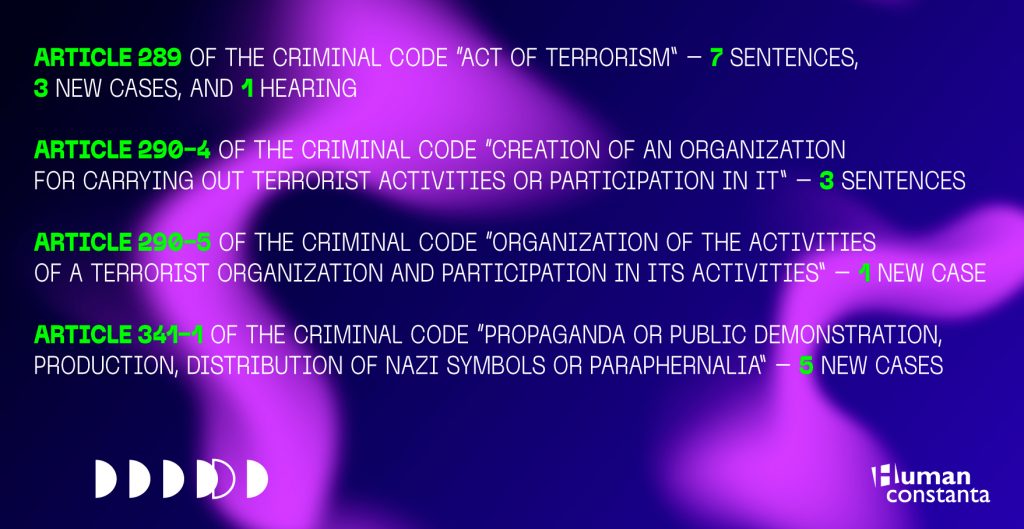
In the analyzed period, harsh sentences continued to be issued on charges of trying to disrupt the republican referendum on the issue of amendments and additions to the Constitution of the Republic of Belarus, which was held in February 2022. On November 2, 2022, it became known about a sentence of up to 6 years in prison against three residents of Minsk, who were called “radicals” in pro-government reports. In addition to other “political” crimes (participation in protests, desecration of state symbols, dissemination of personal data of pro-government activists), they were charged with distributing leaflets in the entrances of residential buildings calling for disrupting the referendum by damaging ballots.
3.4. Article 289 of the Criminal Code “Act of terrorism”
Any actions aimed at using force tactics to counter the authorities, including those aimed only at causing harm to property, and not to people, are interpreted by the authorities as manifestations of “terrorism”. There is a tightening of rhetoric on the part of law enforcement agencies in relation to potential “terrorists”. Thus, the head of the public security police of the MIA, Yuri Nazarenko, stated that “in case of aggressive actions of destructive elements [of a terrorist attack], the internal affairs bodies and internal troops will react in the most severe way, up to the destruction of the enemy. There will be no captivity”. The head of the KGB, Ivan Tertel, also noted : “We will act decisively – to destroy. We will simply destroy the terrorists”. On October 10, 2022, it became known that Alexander Lukashenko instructed “to carry out the necessary measures of a counter-terrorism nature” in connection with “the aggravation of the situation along the border perimeter”. On October 14, 2022, Foreign Minister Vladimir Makei announced the introduction of a counter-terrorist operation regime in Belarus, but later he himself and the press service of the KGB, which is responsible for the introduction of this regime, denied this statement.
The period was marked by sentencing in two high-profile cases under “terrorist” articles. On October 17, 2022, the Grodno Regional Court announced the verdicts in the “Autukhovich case”, in which 12 people are simultaneously involved, including entire families. The defendants had been in custody for two years at the time of sentencing. The court sentenced them to terms ranging from 2.5 to 25 years in prison and fines of up to 1,000 basic units (about $12,700). Depending on their role, they were charged with a total of 15 articles of the Criminal Code, including “an act of terrorism,” “participation in a criminal organization,” “a conspiracy” and other “political” articles. They were accused of setting fire to the cars of police officers, preparing other terrorist attacks, as well as collecting information about the security forces on the instructions of the Ukrainian special services and planning to capture Russian military personnel on the territory of Belarus for torture and transfer the information received from them to Ukraine.
On December 5, 2022, the Minsk Regional Court delivered judgments in the case of the organization “Civil Self-Defense Detachments of Belarus (OGSB)”, recognized as a terrorist organization in Belarus. The court sentenced 5 defendants to imprisonment for a term of 13 to 20 years and fines of up to 700 basic units (about $8,900) on ten articles of the Criminal Code. Members of the informal organization were accused of attempting to blow up the communication center of the Russian navy in Vileyka, attempting to assassinate propagandist Grigory Azarenok, and attempting to destroy logging equipment. One of the defendants stated that the whole case was based on “a provocation by law enforcement agencies”.
Three new criminal cases are known. On October 14, 2022, a man was detained, who confirmed his intention to participate in the opposition initiative “Plan Peramoga,” which is supervised by the BYPOL organization (recognized as terrorist in Belarus). Pro-government sources indicate that the man is charged with “attempted terrorism”. Whether the man will really be charged under the “terrorist” articles of the Criminal Code, or whether this is a propaganda move to intimidate the participants of the initiative is unknown. On November 18, 2022, employees of the Brest GUBOPiK detained a “terrorist fanatic” of jihadist views, who, according to the security forces, reside on the territory of Belarus in stealth, kept in touch with curators from abroad and was preparing for possible active actions in Belarus, including related with terrorism. On December 9, 2022, the KGB initiated a “special proceeding” (trial in absentia) against opposition activist Vadim Prokopiev and two other people who are abroad – they are accused of “attacking the children and home” of Oleg Gaidukevich, a member of the House of Representatives.
3.5. Article 290-4 of the Criminal Code: “Creation of an organization for carrying out terrorist activities or participation in it”
This article is becoming more popular to punish people for any form of cooperation with opposition organizations recognized as terrorist in the territory of the Republic of Belarus, especially for moderating their social networks and instant messengers.
On October 2, 2022, the Brest Regional Court sentenced the “chief visual editor” of the opposition organization “Supratsiu” to 10 years in prison – pro-government sources called him the person who created “the entire visual” of the organization, “the very idea, concept, thought out logos and symbols, developed theory, strategy and tactics”, and “personally voiced almost all terrorist videos”. On November 6, 2022, a Minsker was sentenced to 15 years in prison for administering 30 Telegram channels and chats with the prefix “97,” created by the Nexta organization to “destabilize the situation and subsequently seize state power in Belarus in an unconstitutional way”. On November 11, 2022, a Vitebsk resident was sentenced to 12 years in prison for managing the Vitebsk 97% and Orsha 97% Telegram channels.
3.6. Article 290-5 of the Criminal Code “Organization of the activities of a terrorist organization and participation in its activities”
On December 30, 2022, the General Prosecutor’s Office submitted to court a criminal case against Roman Protasevich, Stepan Putilo and Yan Rudik on the facts of managing one of the most popular opposition channels NEXTA. According to the prosecution, the aforementioned people, “carrying out the general plan of a conspiracy to seize state power in Belarus in an unconstitutional way,” published informational “destructive” materials in the networks of the channels “NEXTA” and “Belarus Golovnogo Mozga” aimed at “inciting people to participate in mass riots” and “calls for acts of terrorism committed by citizens prone to protest”. On December 8, 2022, the Investigative Committee announced the start of “special proceedings” against Putilo and Rudik – they were charged under 10 “extremist” articles of the Criminal Code, Putilo was also separately charged with “organizing the activities of a terrorist organization and participating in its activities”. The authorities did not publish information about the final charges against Roman Protasevich, it is likely that he will participate in the trial in person.
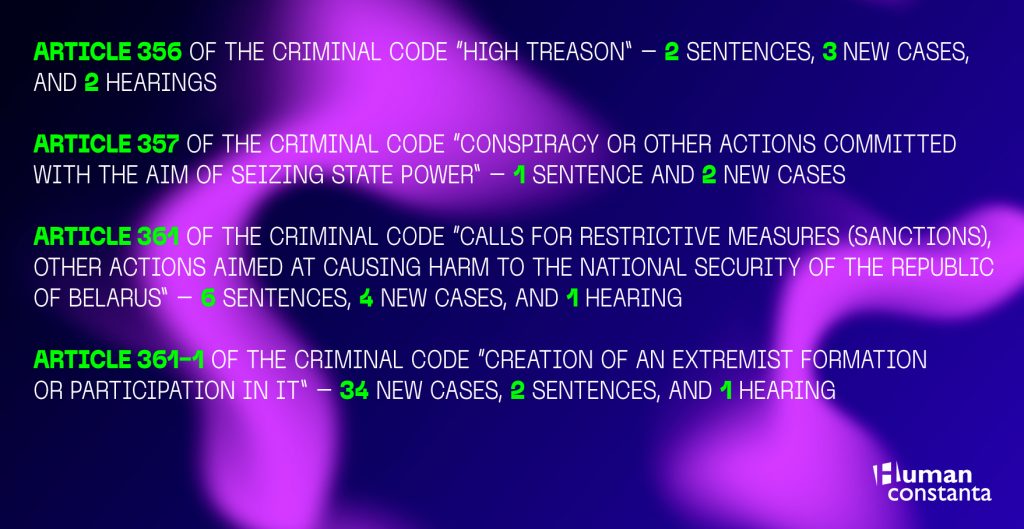
3.7. Article 356 of the Criminal Code “High treason”
This analyzed period was marked by another verdict against independent journalists – the article began to be used to punish people for cooperation with organizations located abroad, even if such organizations have Belarusian roots. There is a tendency to increase the number of cases for “treason,” both in relation to public figures and ordinary citizens.
On October 6, 2022, the Minsk Regional Court announced the verdict to the employees of the BelaPAN news agency. The court sentenced journalist and media manager Andrey Alexandrov to 14 years in prison; sociologist and activist Irina Zlobina – to 9 years; editor-in-chief and director of BelaPAN Irina Levshin – to 4 years, and the former director of the agency Dmitry Novozhilov – to 6 years in prison. The charges included four articles of the Criminal Code: “creation and leadership of an extremist formation” (in November 2021, the agency was recognized as an “extremist formation”), “high treason” (for cooperation with the By_help solidarity fund), “organization and preparation of actions grossly violating public order” (for covering fines and providing other material assistance to detained peaceful demonstrators) and “tax evasion”.
On November 11, 2022, the Gomel Regional Court began to consider the case of Rabochu Ruh. According to the version of the investigation, participants of the movement passed on official information about state-owned enterprises to the intelligence services of the United States and Lithuania, which relates to “methods they are taking to circumvent sanctions”. Also, the defendants in the case are accused of collaborating with the headquarters of Svetlana Tsikhanovskaya and planning to block the production activities of the Belarusian Metallurgical Plant (BMZ) and JSC Grodnoazot. In total, 14 people are involved in this case, 10 of whom are accused of “high treason” and “calls for sanctions” (Article 361 of the Criminal Code). All defendants in the case do not admit their guilt in full. Initially, the process was held in open mode, but on December 27, 2022, for unknown reasons, the sessions were closed to the public.
New cases of persecution are also recorded. On December 15, 2022, on the air of the state channel “Belarus 1”, information was announced about the initiation of a criminal case against the former chief physician of the Belarus sanatoriums in Lithuania and Russia, Andrey Kobel, for cooperation with the Lithuanian special services – he was charged with “high treason” for “collecting data about Belarusians who stayed in sanatoriums” and “gathering information about Lukashenko’s residence in Sochi”. The channel’s plot also tells about the detention of a Latvian citizen Alla Sokolenko, who “on the instructions of the Latvian special services prepared Belarusian military men for recruitment,” as well as numerous detentions of spies from Ukraine. Note that foreign citizens cannot be charged with “high treason” under the Belarusian criminal law. On December 19, 2022, the trial against a 43-year-old truck driver from Lida began, he was charged with “high treason,” however, due to the fact that the trial was closed, the details of the case are unknown.
3.8. Article 357 of the Criminal Code “Conspiracy or other actions committed with the aim of seizing state power”
In fact, the activities of all popular established opposition movements, the purpose of which is to change power in the country and establish a democratic regime, were actually equated to actions committed to seize state power. The persecuted movements promoted non-violent ways of resisting the authorities – peaceful protests and strikes.
The period was marked by the resumption of persecution of representatives of the Opposition Coordinating Council (CC), which, according to the investigation, was created “in an unconstitutional way to ensure the transfer of power” and aimed at “coordinating protest activities” for the subsequent seizure of power in Belarus.
The Prosecutor General’s Office submitted to court a criminal case within the framework of special proceedings against opposition leader Svetlana Tsikhanovskaya, head of the “Country for Life” opposition fund Maria Moroz, head of the People’s Anti-Crisis Department (NAU) Pavel Latushko, members of the Presidium of the CC on organizing the process of overcoming the political crisis Olga Kovalkova and Sergey Dylevsky. Within the framework of ten articles of the Criminal Code, depending on the incriminated roles, opposition politicians are accused of organizing strikes contrary to the law in order to “undermine the national economy and strengthen sanctions,” “ensure the growth of protest moods for the subsequent seizure of power,” “high treason,” “conspiracy,” “appropriation of the title and power of an official,” “creation of an extremist formation,” and other “political” crimes.
Also on December 28, 2022, the security forces detained Minsk tutor and founder of the tutoring center Yevgeny Livyant: pro-government sources indicate that Yevgeny “directly attempted to seize state power by participating in the so-called Coordination Council”. This case testifies to possible repressions not only against prominent politicians from the Presidium of the Constitutional Court, but also against ordinary citizens who, for the sake of solidarity, applied to join the expanded composition of the Constitutional Court.
On November 11, 2022, the Minsk City Court announced the verdict in the case of the “Country for Life” foundation, founded by political prisoner Sergei Tikhanovsky – Anton Stashevsky was sentenced to 8 years in prison under Article 357 of the Criminal Code, Marina Dubrovskaya to 1.5 years in prison for participating in protests. This case initially involved four volunteers of the foundation, who were detained in the summer of 2021 as part of a “large-scale KGB operation to clean up radical people” on charges of “financing extremism”. Later, two of the volunteers were able to evacuate from Belarus, they were put on the wanted list.
3.9. Article 361 of the Criminal Code “Calls for restrictive measures (sanctions), other actions aimed at causing harm to the national security of the Republic of Belarus”
The period was marked by the first in the history of observations sentence in absentia within the framework of “special proceedings” against opposition figures who are abroad. On December 26, 2022, the Minsk City Court sentenced Olympic medalist Alexander Herasimenia and Acting Director of the Sports Solidarity Fund Alexander Opeykin in absentia to 12 years in prison on charges of inciting harm to national security (Part 3 of Article 361 of the Criminal Code). According to the Investigative Committee, they demanded the imposition of sanctions against the National Olympic Committee of Belarus and other sports organizations, insisted on refusing to host international competitions in Belarus, in particular the Ice Hockey World Championship, and urged event sponsors to withdraw their support. Among other things, the defendants were accused of calling to prevent the athletes of the Belarusian national team from participating in competitions, including the Olympic Games, and not to allow them to compete under the official flag. In order to compensate for the harm, all property belonging to Herasimenia located on the territory of Belarus was confiscated: more than 48 thousand dollars in bank accounts, mobile phones, an apartment, a car seat, a refrigerator, an acoustic system. Also on December 19, 2022, the Investigative Committee began special proceedings against opposition politician Valery Tsepkala, who is accused under 12 articles of the Criminal Code – the list of articles, in addition to the “traditional” articles on incitement of enmity, calls for sanctions, and the creation of an extremist formation, includes article 123 of the Criminal Code (“Propaganda of war”), which was not previously used in the practice of government agencies.
The main goal of such lawsuits is to put pressure on opposition activists abroad by confiscating their property, and, more recently, depriving such people of Belarusian citizenship. Prosecutor General Andrei Shved said that the practice of proceedings in absentia “is now being developed, and in the near future there will be more and more such proceedings”.
The period was marked by the use of this article against representatives of independent labor unions – due to the closed nature of the processes, it was not possible to find out the essence of the charges, most likely any independent or opposition activity (including the organization of strikes) at state-owned enterprises, which are described in pro-government narratives as “strategically important facilities,” was interpreted by law enforcement agencies as “harm to national security”. Four trials are known in this context:
- On October 26, 2022, the court sentenced Artsiom Zhernak, chairman of the primary labor union organization of the free union of metalworkers at the Minsk Automobile Plant (MAZ), to 4 years in prison;
- On November 15, 2022, the Minsk Regional Court sentenced Aliaksandr Mishuk, chairman of the independent labor union Belaruskali OJSC, to 2.5 years in prison for speaking to workers “in order to create a strike committee”. Alexander explained his performance with emotions due to mass violence from the security forces;
- On November 25, 2022, the Minsk City Court began considering the case against three activists of the independent labor union of workers of the radio-electronic industry (REP) Henadz Fiadynich, Vasil Berasnieu and Vatslau Areshka;
- On December 26, 2022, the same court sentenced the activists of the Belarusian Congress of Democratic Labor Unions – chairman Aliaksandr Yarashuk was sentenced to 4 years in prison for “calling for sanctions,” his deputy and the accountant were sentenced to 1.5 and 2 years in prison, respectively, under the article on “gross violation of public order”.
The dissemination of information with calls to resist the authorities began to form a crime not only under the article on “incitement of enmity” – in some cases, such actions began to be interpreted as “calls to harm national security,” while the logic of the security forces in choosing an article for prosecution in this context is unknown. On November 29, 2022, the General Prosecutor’s Office sent a criminal case to court against a resident of Minsk: according to the prosecution, the man distributed messages in which he called for and formed a desire to participate in unauthorized mass events that grossly violate public order and that will obviously interfere with the normal functioning of state institutions, will cause a blockage of public transport, will interfere with the unhindered work and rest of other people. On December 12, 2022, the Minsk Regional Court sentenced 4 residents of Soligorsk to prison terms ranging from 5.5 to 10 years for protest activity, including distribution of leaflets aimed at “inciting enmity” and other printed materials with “calls to seize power, violent change of the constitutional order and other crimes against national security”.
The article continued to be used to repress representatives of civil society. On November 11, 2022, the court sentenced social activist Anastasiya Kukhta to 5 years in prison, the details of the case are unknown. On December 12, the Prosecutor General’s Office submitted to the court criminal cases against the defendants in the “TUT.by case” Maryna Zolatava, Volha Loika, Liudmila Chekina, Alena Talkachova, Katsiaryna Tkachenka. The investigation stated that in addition to committing “economic” crimes, the journalists “were directly related to the materials published on the TUT.by website,” which contained “a deliberately positive assessment of the actions of opponents of the authorities, a deliberately negative reflection of the decisions of officials who advocated the preservation of the current constitutional system, covert coordination of protest activity in society, information aimed at destabilizing the situation in the country and causing harm to the national security of Belarus”.
Also, on October 21, 2022, an employee of the BelVEB bank was detained for his protest activities against the war in Ukraine; after his arrest, he was charged with Article 361 of the Criminal Code. It is known that during the search he was planted with protest symbols and pornographic materials.
3.10. Article 361-1 of the Criminal Code “Creation of an extremist formation or participation in it”
The article continues to be used to repress any form of self-organization of society in resistance to the regime. The activities of the security forces are expanding to identify opposition structures and their leaders, who, according to them, are preparing for radical methods of confronting the regime.
On November 9, 2022, the security forces announced the detention of all the participants of the initiative “Sayuz of the Belarusian National Shchyt,” recognized as an “extremist formation”. The investigation states that the five detainees “carried out active extremist activities in each region, discussed and planned acts of sabotage and terrorist attacks, including on the railway and using Molotov cocktails”. On November 14, the administrator of this “extremist formation” was detained.
On December 13, 2022, it became known about another criminal case against representatives of the United Transitional Cabinet – this time Svetlana Tsikhanovskaya, Alexander Azarov (head of BYPOL) and Valery Sakhashchik (responsible for defense and national security issues in the Cabinet) are accused of “creating an extremist formation”. These accusations are a consequence of the creation by the Cabinet of the sports and educational initiative “The Pospolite ruszenie”, the purpose of which is called the revival of Belarusian military traditions. According to the security officials, as part of the initiative, representatives of diasporas and students studying abroad intended to undergo security training and then return to Belarus “to conduct sabotage, terrorist and undercover work”. It is known about new criminal cases against representatives of other opposition political movements: on November 11, 2022, the leader of the Mogilev branch of the “Country for Life” opposition movement was detained.
21 cases of criminal prosecution are related to the registration in the Telegram bot of the “Plan Peramoga,” including 2 people who are already serving sentences in the form of restriction of freedom with referral to an open correctional institution (“chemistry”) for other “political” crimes. In fact, none of the detainees committed any practical actions to resist the regime within the framework of this initiative; most of those who registered did not even receive any tasks. The reason for the detention is not only the actual registration in the initiative, but also the “traces” of communication with the bot left after a voluntary attempt to exit the initiative on one’s own. For example, it is known about the detention of a man who, after receiving a message with a task, blocked the bot of the initiative, and deleted his Telegram account. Pro-government sources report that registered participants in the initiative can voluntarily come to the GUBOPiK departments, repent and refrain from committing crimes, after which they can be released from criminal prosecution on the basis of a note to Article 361-1 of the Criminal Code (a person is released from liability if they contributed to the identification, prevention or suppression of extremist activity by timely notification to state bodies or by other means).
The persecution of administrators and moderators of opposition Telegram channels, whom law enforcers consider to be the creators and leaders of “extremist formations,” continues. In view of the fact that the “dzechat” initiative (a map with the location of all Belarusian opposition chats) is recognized as an “extremist formation,” in fact any chat is a structural subdivision of this “extremist formation”. It is known about the detention of the administrator of the Brest chat “GOBK” and the administrator of one of the local Vitebsk chat rooms, in which, according to the security forces, calls were made to commit violent acts against law enforcement officers. On December 16, 2022, pro-government sources reported the detention of 2 administrators and 10 “activists” of the local opposition chat “Chizhovka Sem Chizhey,” separately recognized as an “extremist formation”. It should be noted that most such detentions under Article 361-1 of the Criminal Code are carried out before the resources, the administration of which is imputed to people, are recognized as “extremist formations”. Punishing people for administering resources in the past, when their activities were not yet banned, is a gross violation of the law by the security forces – according to Article 9 of the Criminal Code, a law that establishes the criminality of an act, increases the punishment or otherwise worsens the position of the person who committed this act, is not retroactive.
On December 19, 2022, it became known that the prosecutor’s office submitted a criminal case to court under 12 articles of the Criminal Code against the administrator of the opposition chat network “97%”. The woman returned to Belarus within the framework of the pro-government program “The Way Home,” in which political emigrants are offered to “return home” and “repent”. Earlier, a man contacted the woman and offered to come to Belarus, explaining that he was “a former security official with extensive connections” and “learned through his channels that she was not wanted at home”. Arriving in Belarus, the woman was detained and placed in a pre-trial detention center.
This article also continues to be used to repress independent journalists – Aliaksandr (Ales) Liubenchuk was sentenced to 3 years in prison, but it is not known which particular “formation” he is charged with. Despite the fact that any form of interaction with “extremist formations” is interpreted as “aiding to extremist activity” (Article 361-4 of the Criminal Code), there are cases of punishment for such actions as “participation in an extremist formation”. Thus, on December 26, 2022, journalist Ivan Muraev was sentenced to 2.5 years in prison for filming an investigation by journalist Stas Ivashkevich, which was broadcast on the Belsat TV channel. Not only independent media, but also local samizdats began to be recognized as “extremist formations,” in connection with which, under Article 361-1 of the Criminal Code, the security forces began to detain couriers, publishers and administrators of such printed publications – on October 27, 2022, employees of the GUBOPiK, together with the Special Rapid Response Unit (SOBR) detained the editor of samizdat Vestniki, who wrote and edited texts in the opposition format.
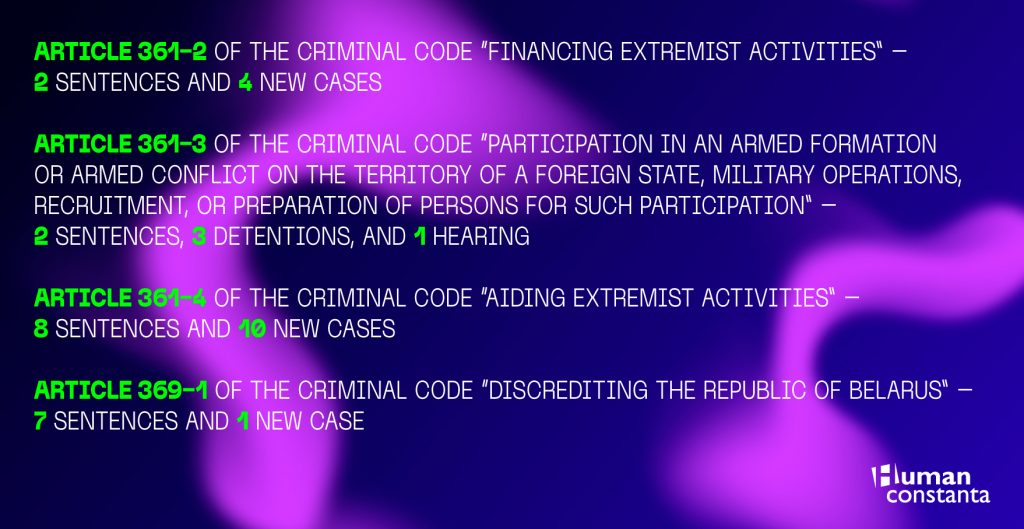
3.11. Article 361-2 of the Criminal Code “Financing of extremist activities”
This article has been regularly used by law enforcement agencies to prosecute people who have made monetary or other material donations to solidarity funds or opposition organizations recognized in Belarus as “extremist formations,” while criminal cases are initiated regardless of the method and amount of the transfer.
It is known about 4 detentions for donations to the BySol solidarity fund. A Minsk resident was detained for “two or three transfers in the amount of about $10,” while pro-government resources noted that a separate criminal case would be initiated for each transfer. Also, a married couple was detained for several transfers through a plastic card to the fund for a total of 50 rubles (about $ 20) and a resident of Gomel was detained for transfers through Facebook. It is also known that a criminal case against a Minsk resident, who is accused of “financing extremism” in the amount of $1,150 “for reasons of political and ideological enmity” was submitted to court.
On October 24, 2022, the Minsk City Court sentenced the former press secretary of the A1 company to 4 years in prison on charges of money transfers to opposition blogger Anton Motolko. In particular, the man was accused of purchasing advertising on resources owned by Motolko, while, according to service contracts published by pro-government sources, advertising services were provided before Motolko’s resources were recognized as “extremist materials” and before he was recognized as “involved in terrorist activities”.
On November 1, 2022, the same court sentenced a resident of Minsk to 3 years in prison for transferring 0.2 ethereum (about $800) to the crypto wallet of the BYPOL organization. We recorded the establishment of the practice of convicting people for actions with “extremist formations,” which at the time of the action were not recognized as “extremist” – the court did not take into account, that the transfer was carried out in May 2021, while the organization was recognized “an extremist formation” only in November 2021.
3.12. Article 361-4 of the Criminal Code “Aiding extremist activities”
During the analyzed period, this article was used to repress representatives of civil society who gave interviews or comments to “extremist” independent media. The period was marked by at least 4 cases of persecution: a former professor of the Minsk State Linguistic University and a representative of the CC Natallia Dulina; Darya Losik, wife of political prisoner Igor Losik; human rights activist Nasta Lojka were detained; also a criminal case was initiated against Oleg Talerchik, a former employee of the BYPOL initiative. It should be noted that pro-government sources claimed that Nasta Lojka gave an interview to Euroradio, although in one of the “repentant videos” the human rights activist stated that she did not participate in the interview – the publication itself took the information from her post on Facebook and published it without permission (later the human rights activist was charged under other articles of the Criminal Code).
On December 23, 2022, the Minsk City Court passes the first “precedent” sentence for giving an interview – military analyst Yahor Lebiadok was sentenced to 5 years in prison on charges of giving an interview “on the topic of conducting a special operation by the Armed Forces of the Russian Federation on the territory of Ukraine and the role of Belarus in it, in order to “ensure the activities of a public destructive channel, the information products of which are recognized by the court as extremist materials”. This verdict allows us to conclude that the charges of “aiding extremism” are brought for interaction not only with resources recognized as “extremist formations,” but also with organizations that so far have only the status of “extremist materials”.
The practice of punishing people who interacted with opposition resources in any form, including those who sent any materials, continues. So, on November 16, 2022, the Grodno Regional Court sentenced the leader of the liquidated Belarusian Independent Labor Union to 5 years in prison for a talk with a Belsat journalist, during which the man, according to security agencies, “transmitted information”. On November 21, 2022, the Brest Regional Court sentenced Sergei Nikityuk to 3 years in prison for sending a photo of the ballot of the referendum on amendments to the Constitution of Belarus to the Telegram bot of the NEXTA editorial office. On December 3, 2022, a resident of Gomel was detained for sending information to independent media and NEXTA.
On December 20, 2022, the Prosecutor General’s Office initiated a criminal case against blogger Andriy Pavuk. According to the prosecutor’s office, the blogger published on his Telegram channel a link to a video in which “posing as a judge, he called prosecutors and their close relatives”. In that conversations, the blogger “deliberately reported false information about the political situation in Belarus, spread slanderous information about Lukashenko”. A criminal case was initiated under the article on “aiding extremist activities,” despite the fact that the charges are the disposition of the article on “discrediting the Republic of Belarus” (Article 369-1 of the Criminal Code).
3.13. Article 369-1 of the Criminal Code “Discrediting the Republic of Belarus”
On December 2, 2022, the Minsk City Court sentenced former Belteleradiocompany journalist Dzmitryi Luksha to 4 years in prison, his wife Polina Polovinka to 2.5 years in prison, a videographer to 3 years of “home limitation of freedom;” they were also fined. They were accused of creating fake stories for the Kazakh TV channel Khabar 24: according to law enforcement agencies, the journalist’s wife introduced herself as a Syrian citizen and, based on a pre-prepared text, told the camera about non-observance of the rights of migrants, dissatisfaction with their basic needs, lack of food and water. The journalist was also accused of creating a fake story about the shortage of goods in Belarus. Detentions of journalists for “discrediting” continued – on December 6, 2022, journalist Larisa Shchiryakova was detained under this article.
It is known about 6 verdicts under this article against detainees in the “Zeltser case”. Many of those convicted in this case claimed that they left comments without understanding the situation thoroughly (for example, thinking that the video with the shootout showed criminals breaking into the house or even thinking actors were filmed in this video).
So, on October 26, 2022, the Zheleznodorozhny District Court of Gomel sentenced a local resident to 2 years in prison for two comments: “It’s worse in the country than in Somalia” and “If I had a gun and such people came at me, I would also defend my house and I would also built barricades”. The forensic examination concluded that the comments do not incite enmity, but contain “a negative assessment of the political situation in the country in general and of the professional actions of law enforcement officers in particular”. On November 18, 2022, a resident of Gomel was sentenced to 1.5 years in prison for a comment on social networks containing the words “gopota” and “break in”. The court acknowledged that this comment contains deliberately false information, undermines the authority of the Republic of Belarus and state bodies, and also contributes to “the formation of false ideas that the rights and freedoms of citizens are not respected in the republic”. According to forensic experts, the semantics of the words “break in” is a negative assessment of the actions of the KGB officers.
Cases on administrative offenses
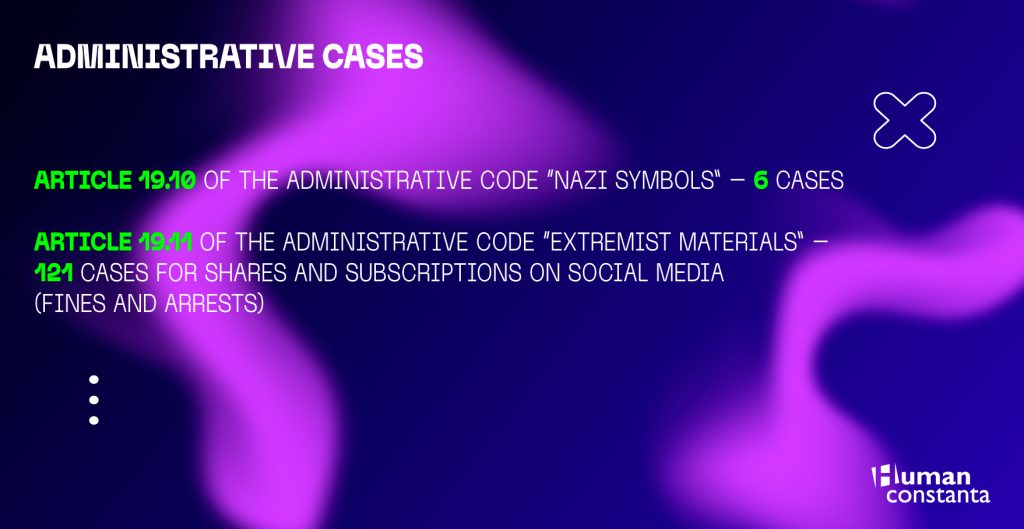
Security forces continue “raids”, accompanied by mass detentions, to the offices of various organizations and places of deprivation of liberty in order to reveal the facts of storage or distribution of prohibited materials in people’s devices. If earlier many courts refused to punish people for subscribing to extremist online resources, then the latest periods of our observations indicate that persecution for subscribing is rooted in the general repressive practice. This period is marked by the expansion of the practice of prosecution for the distribution of Nazi symbols, including in the form of tattoos, not only within the framework of administrative processes, but also in criminal proceedings.
4.1. Article 19.10 of the Code of Administrative Offenses “Propaganda or public demonstration, production, distribution of Nazi symbols or paraphernalia”
GUBOPiK employees continued to detain (the security forces continued to use the term “denazify”) people for thematic tattoos, however, compared to the previous analyzed period, there were fewer such cases. It is known about the detention for tattoos in the form of a swastika on the arm, a Nazi soldier’s tunic, a portrait of Adolf Hitler and prison “tattoos” of a fascist theme. Nevertheless, the practice of punishment is expanding not only within the framework of the legislation on administrative offenses, but also within the framework of criminal cases under Article 341-1 of the Criminal Code, which can be used against people who were brought to justice three times during the year under Article 19.10 of the Code of Administrative Offenses. Usually, people who, on “repentance videos,” promised to remove tattoos after serving their sentence, but did not do so, fall under criminal prosecution. It is also known about the case when the security forces found in the Instagram account of a clothing store a photograph in which a male model had a tattoo in the form of the Nazi symbol “Black Sun”: GUBOPiK employees held a preventive conversation with the owner of the store, and the man himself was punished by arrest. For three months, 5 cases of persecution for tattoos were recorded, including 3 in criminal proceedings.
Also, 6 cases of arrests were recorded for distributing Nazi materials on the Internet, including 2 in criminal proceedings − people are known to be punished for posting Nazi symbols on Twitter, posting a video with a Nazi greeting to Hitler’s speech on TikTok, posting a swastika on social networks and forwarding this symbol in private messages.
4.2. Article 19.11 of the Code of Administrative Offenses “Distribution, production, storage, transportation of information products containing calls for extremist activity or promoting such activity”
4.2.1. Legal entities
The analyzed period was marked by the continuation of “inspections” by the prosecution authorities of bookstores for the presence in their catalogs of printed publications recognized as “extremist materials”. On November 4, 2022, the Brest Prosecutor’s Office found banned books on the electronic platform “bonLibro.by” and initiated an administrative process against it under part 2 of Article 19.11 of the Code of Administrative Offenses. On November 8, 2022, the prosecutor’s office of the Savetsky district of Minsk, as part of an act of supervision, found in a large online store a book by heraldist Viktor Lyakhor “Military History of Belarus. Heroes. Symbols. Colors” and demanded that its “demonstration and offer for purchase” be excluded. On November 24, 2022, the prosecutor’s office demanded the removal of the book “Agrarian Policy of the Nazis in Western Belarus: Planning. Security. Implementation (1941-1944)” and “The Ballad of a Little Tug”.
4.2.2. Individuals
In October-December, we know about 98 people detained for distributing “extremist materials,” including in the form of reposting “forbidden” publications, as well as forwarding them in personal messages and group chats. In view of the fact that almost all independent media and opposition resources are recognized as “extremist materials,” the dissemination of virtually any information that is objectionable to the authorities can be considered an offense. Also, 22 people were detained for subscribing to “extremist” Telegram channels, as well as for leaving any comments in such channels. There is a gender differentiation in the choice of punishment − women are more likely to be fined, while male detainees were almost always sentenced to arrest, and for a maximum possible period of 15 days. It is also known that the detention of two residents of Mogilev ended with “preventive conversations” with them as a measure of responsibility for the inadmissibility of spreading extremist materials.
This period was marked by “raids”, during which security forces checked the devices of people previously noticed in protest activities for the presence of “extremism” in them. So, on November 16, 2022, two residents of Mogilev were detained under Article 19.11, who “back in 2020 undermined their civil authority and currently do not fully realize the full responsibility for the dissemination of extremist materials”. Also, GUBOPiK employees actively arranged checks on the devices of prisoners serving sentences in the form of “limitation of freedom” − in total, in early November, 22 people were detained in 12 institutions throughout Belarus, in whose phones “forbidden” materials were found.
Security forces systematically carry out mass arbitrary detentions in specific cities or enterprises. So, on October 4, 2022, the MIA reported on the detention of 20 employees of the Belagro enterprise on charges of “distributing extremist materials”. On November 24, 2022, security forces massively detained employees of the Inkasso.Expert financial institution − after the raid, 5 people were sentenced to 10 days of arrest. It is also known that in mid-November, the security forces carried out a “cleansing operation” in the Buda-Koshelev district, during which the local court punished 17 people for subscribing to “extremist resources,” and confiscated phones from 7 of them as “instruments of offenses”. On December 12, 2022, GUBOPiK officers conducted a “raid” in Braslav, during which about 15 people were detained, most of them for reposting.
The practice of holding people accountable for reposting materials that were made even before they were recognized as extremist continues. On November 4, 2022, the Brest court punished priest Igor Kondratyev with 12 days of arrest, and the editor of the Tsarkva newspaper with 15 days of arrest for reposting the posts of the Belsat publication, left on the Facebook page in May 2021, although the publication was recognized as “extremist materials” only in July 2021. In November 2022, activist Viktar Marchik was punished with arrest twice in a row for reposts made in 2020-2021. On December 12, 2022, a resident of Braslav was detained for sending news from an independent Telegram channel to a local chat in 2020. The security forces recognize such offenses as “continuing,” and therefore, on the basis of Article 4.6 of the Code of Administrative Offenses, they are not subject to the standard statute of limitations for bringing to justice in 2 months from the date of the offense comitted − for such cases, a period of 2 months from the date of detection of the fact of illegal activity is established.
On October 29, 2022, in Rogachev, members of the Tor Band group, who released Belarusian songs of the opposition format, were detained together with their wives (7 people in total). Their music videos were declared “extremist materials” and the musicians themselves were punished with 15-day arrests for distributing “banned” materials. Also, police officers visited people who starred in the group’s videos with “preventive talks”.
The security forces continue to repress people for “wrong” tattoos – on October 6, 2022, a Minsker was detained, who attracted the attention of the security forces with a photograph on social networks with a tattoo of four letters, symbolizing a negative attitude towards police officers.
Changes in the Republican List of Extremist Materials
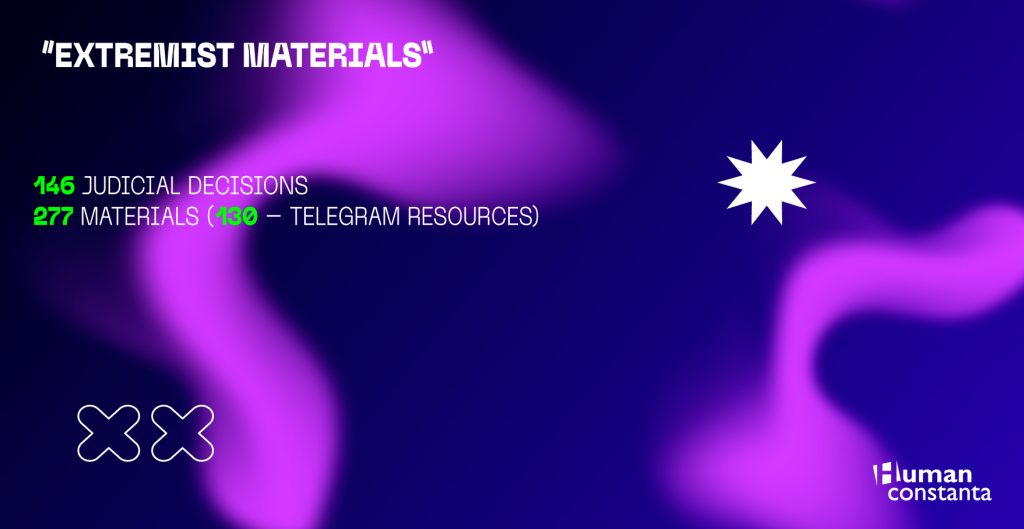
In October-December 2022, the Republican List of Extremist Materials (hereinafter referred to as the list) on the website of the Ministry of Information contained information about 146 new court decisions on recognizing materials as extremist (in the last analyzed period − 112). A total of 277 information materials were banned (in the past three months − 217), of which 130 materials are Telegram resources. As of January 1, 2023, there are 2849 materials on the list, including 1019 Telegram resources. With the exception of single types of neo-Nazi products, as well as one religious work, all materials were included in the list for “political” reasons.
In December 2022, information was published on the website of the Minsk City Executive Committee for members of propaganda groups called “The main directions of state policy in the field of information security”. According to the document, since the end of 2021, 684 materials have been included in the list based on 420 court decisions, and there has been a sharp increase in the number of such products. In just a year, 300 Telegram channels and chats were included in the list, 160 of them ceased their activities. In total, 778 Telegram resources appear on the list. According to our data, for the whole of 2022, the authorities recognized as “extremist materials” almost 2 times more resources than indicated in official statistics: 1.315 types of products were included in the list during the year based on 631 court decisions.
The courts continued to recognize as “extremist” local opposition chats (city, district and street chats) from virtually all regions of Belarus. The bans on the resources of strike committees continue: the authorities banned the chats of the Belarusian Metallurgical Plant, the Gomel labor union, as well as three Vitebsk educational institutions − Vitebsk Medical University, Vitebsk Masherov University and Vitebsk Veterinary Academy. During this period, there is an “increased attention” of the courts to chats from Lida and Mozyr, some Mozyr chats were included in the list twice, based on the decisions of the Gomel and Mozyr courts. Due to the fact that almost all opposition accounts aimed at an audience within the country were recognized as “extremist materials,” the courts began to ban the resources of the Belarusian diasporas abroad. On November 30, 2022, the chat “Belarusians of Wroclaw” became the first foreign chat of Belarusians on the list, then in December the court recognized the Instagram account of Belarusians from Austria as “extremist”.
The Internet resources of opposition initiatives continued to be included in the list: the websites and social networks of the Belarusian Investigative Center and the opposition movement “Forum of Democratic Forces,” the Telegram channel of the Representative Office for Defense and National Security of the United Transitional Cabinet, the Telegram channels of the Belarusian units “Pahonia” and “Terror”, Instagram account of the Free Belarus Center initiative to help political emigrants, groups in Odnoklassniki and Telegram channel of the election observation initiative Honest People, TikTok accounts of opposition politician Pavel Latushko and NEXTA channel. The listing of oppositional YouTube resources continued: the channels of the bloggers BalaganOff and Sergei Bespalov, as well as interview with priest Vyacheslav Barok on the popular channel “life-raspberry”, and separate news stories of the Belsat TV channel, were included in the list.
For the first time in the history of observations, podcasts were recognized as extremist − the podcast “Economics with Chaly. Let’s figure it out” by economic analyst Sergei Chaly on all streaming platforms. On December 29, 2022, information appeared in pro-government sources about the recognition of the “New Belarus” online platform (the resource itself, its social networks, mobile application) as “extremist materials” − resource contains a map of Belarusian businesses abroad, content on Belarusian cultural topics and others support features.
Resources of independent media continued to be recognized as “extremist materials”: Instagram accounts of Media Polesie, Euroradio and Zerkalo_io; social networks, a watermark and symbols of the KYKY.ORG publication, as well as electronic versions of the releases of samizdat The Word of Belarusians. The law enforcers also paid attention to other human rights resources – the Instagram accounts of the Viasna human rights center and the International Committee for the Investigation of Torture in Belarus, as well as the channel on political persecution “They Have the Right” and a number of channels on the results of court monitoring were declared “extremist”.
For the first time, postal parcels were recognized as “extremist materials” − the court of the Oktyabrsky district of the city of Minsk recognized about 70 postal items as “extremist”. Most of these parcels contained various souvenir paraphernalia with opposition symbols. Thus, the list was supplemented by a sweatshirt with the inscription “Kus for Belarus;” a wooden stand in the form of a castle, “containing the image of a rider on a horse with a sword raised above his head”; magazines with comics “Kazki-Kraski,” phone cases with “an image of a man holding a piece of white-red-white fabric” and other products, probably confiscated, containing opposition symbols. Also, the Internet resources of the Baranovichi store of national symbols “Rosquit” were recognized as “extremist”.
During the analyzed period, 5 books were recognized as “extremist materials”. One of the books included in the list is “Motherland: a colorful story from Rogneda to Kosciusko” by writer Vladimir Orlov and artist Pavel Tatarnikov. The book is the first illustrated guide to the history of Belarus; in 2017, the state channel STV published a positive review of the book and mentioned that it would be useful “even to the smallest readers”. The list includes 2 books of the Yanushkevich publication, which, together with its founder Andrei Yanushkevich, is constantly subjected to pressure from propagandists and security officials. One of them is “The agrarian policy of the Nazis in Western Belarus: Planning. Provision. Implementation (1941-1944),” the content of which could not be established. Also, the book “The Ballad of the little tug boat,” a translation into Belarusian of a children’s book by Nobel laureate Joseph Brodsky, was recognized as “extremist”. Despite the fact that the ballad was published in 1962 and has nothing to do with Belarus, it still attracted the attention of GUBOPiK employees. According to one of the employees, the white-orange-white color of the tug in the illustrations in the book was “suspicious” − probably, the employee “saw” in these illustrations a hidden subtext associated with the opposition white-red-white symbols. The list was supplemented by Muslim literature − a book about the Quran called “An Interpretation of the Last Ten Juzs of the Noble Quran, followed by important questions concerning a Muslim” was recognized as “extremist”.
In November 2022, the list was supplemented by the information about the recognition as “extremist materials” of the products of the Belarusian musical group Tor Band, whose members were repressed. As it turned out, back on August 29, 2022, the court of the Central District of Gomel recognized social networks, a Patreon account for donations, the band’s logo, as well as a number of popular opposition songs, including “Long live Belarus,” “Go away,” “Who, if not you?,” “Mother,” “We are not a narodets,” “Without a war,” “Belarusian to Belarusian − Belarusian,” “Dead Christmas,” “We will become stronger!” and “Native land”. Also the YouTube channel “Free Choir,” a cultural movement of Belarusian musicians; as well as the video “Flowers and Bullets” by Deadfall group were included to the list.
The pressure on the anarchist community continues: once again, the site and social networks of the “Pramen” movement were recognized as “extremist” (the resources of the movement have been regularly replenishing the list since 2016). Traditionally, the list was supplemented by single Nazi information products: the Volkischer Beobahter Telegram store of Nazi paraphernalia, the neo-Nazi historical channel Germanische ᚢ Tradition, Otto Skorzeny’s book “The Unknown War”, which is a memoir of an SS officer about World War II. The practice of inclusion in the list of sticker packs in Telegram is also expanding: in total, during the analyzed period, 6 sticker packs were recognized as “extremist,” 1 of which contains protest symbols, the rest contain images of Hitler and Nazi symbols.
Changes to the List of Organizations, Formations, Individual Entrepreneurs Involved in Extremist Activities
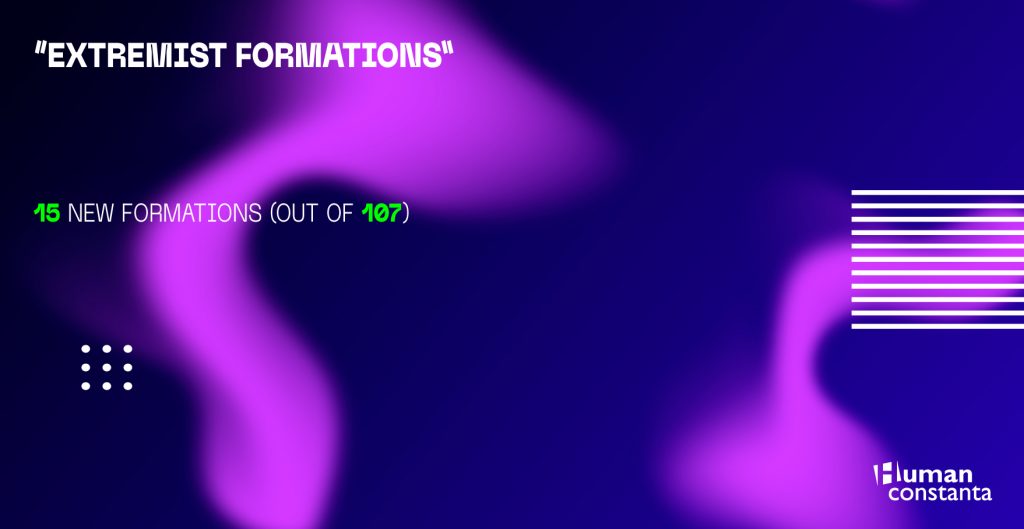
At the moment, the List of organizations, formations, individual entrepreneurs involved in extremist activities includes 107 formations that are recognized as such by decision of the MIA or the KGB. For three months, the list was replenished with 15 positions. All additions to the list were accompanied by criminal cases against the relevant groups of people. Creation, leadership or participation in an “extremist formation” is punishable by up to 7 years in prison under Article 361-1 of the Criminal Code.
At the end of December 2022, 10 regional media and nationwide online resources were included in the list. During the analyzed period, another media outlet, the Grodno publication Hrodna Life, was recognized as an “extremist formation”. The MIA also included the Vestniki network of regional samizdats in the list.
For the first time, a non-profit organization was recognized as an “extremist formation” – the environmental organization Ecodom, created to promote sustainable development, was included in the list. The Lithuanian organization “Dapamoga,” created to ensure the safety of dissidents and adapt them to normal life in Lithuania was also recognized as the “formation”.
There is an expansion of the practice of recognizing paramilitary units created by Belarusian dissidents abroad as “extremist formations”. According to the decision of the MIA, the organization “Pospolite ruszenie” and its branches “Gdansk,” “Wroclaw,” “Vilna,” “Warsaw” and “Bialystok” squads (created by the United Transitional Cabinet in order to revive Belarusian military traditions) were included in the list. Also, the list was supplemented by the Belarusian regiment “Pagonya,” created for military support of the AFU.
The use of this tool to persecute opposition movements continued. For “organizing activities to prepare for the commission of attacks on sovereignty and public security,” the MIA recognized the movement “Country for Life” as an “extremist formation”. The list of “formations” was also supplemented with an informal group of supporters of the 2020 presidential campaign participant Valery Tsepkala, as well as the opposition organization of athletes “SOS-BY”. During this period, 4 opposition chats, as well as the resources of the opposition blogger Ivan! Real Belarus were included to the list.
Separately, it is worth noting the recognition as an “extremist formation” of a group of six people called “Xinkalik” in “Zello-walkie-talkie” − an application that helps drivers navigate the situation on the roads. The reason for including this group of people on the list is unknown.
Changes in the List of Nazi Symbols and Paraphernalia and the List of Organizations and Other Structures Specified in Paragraph Three of Part One of Article 1 of the Law of the Republic of Belarus “On Preventing the Rehabilitation of Nazism”
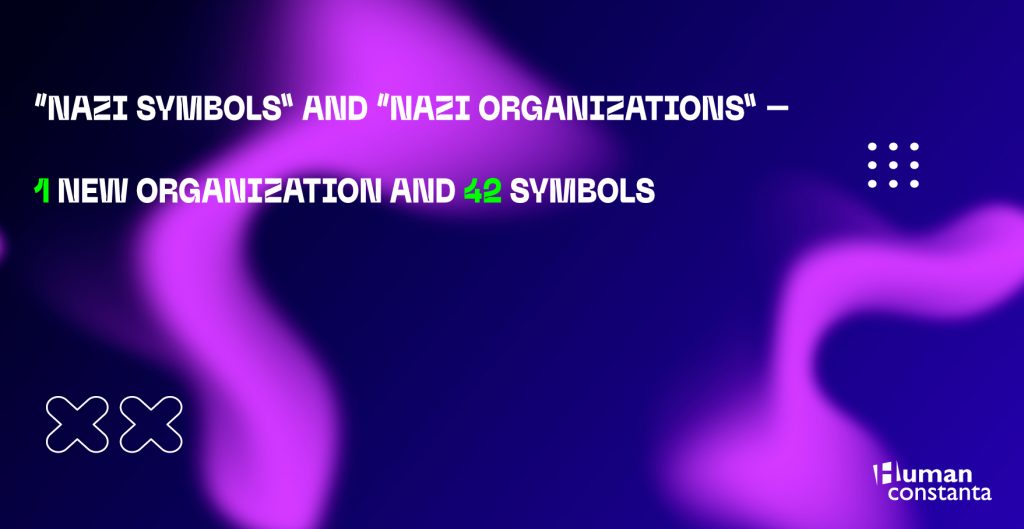
On October 28, 2022, the MIA adopted Decree No. 271, which approves the updating of two lists created on the basis of Article 1 of the Law “On Preventing the Rehabilitation of Nazism” − the List of Nazi symbols and the List of “Nazi organizations and structures” were updated.
Previously, the list of banned organizations included the National Socialist Workers’ Party of Germany (NSDAP), the National Fascist Party of Italy, the Gestapo, the German SS and SD detachments, as well as the collaborative punitive structure “13th Belarusian police battalion under the SD”. During this period, the list was replenished with another Belarusian organization − the 30th Grenadier (Infantry) Division of the Waffen-SS, which participated in anti-partisan operations.
The previous version of the list of Nazi symbols consisted of 10 items; in the analyzed period, it was replenished by 42 items. The basis of the changes were the emblems of tank, motorized infantry and other divisions of the Wehrmacht, and the “Black Sun” emblem (Schwarze Sonne) was also added to the list. The most resonant update of the list was the inclusion of the exclamation “Long live Belarus” and the recall “Long live,” accompanied by a raising of the right hand with a straightened palm, which appears in the list as “collaborationist”. This expression (without appropriate gestures) is the most popular Belarusian national patriotic motto and the main opposition slogan, the use of which is persecuted by the Belarusian authorities. It is not clear for certain whether, in the practice of the security forces, the exclamation “Long live Belarus” without gesture accompaniment or its use in the text will be considered a manifestation of Nazism and prosecuted under the relevant articles of the Code of Administrative Offenses and the Criminal Code.
Changes in the List of Citizens of the Republic of Belarus, Foreign Citizens or Stateless Persons Involved in Extremist Activities
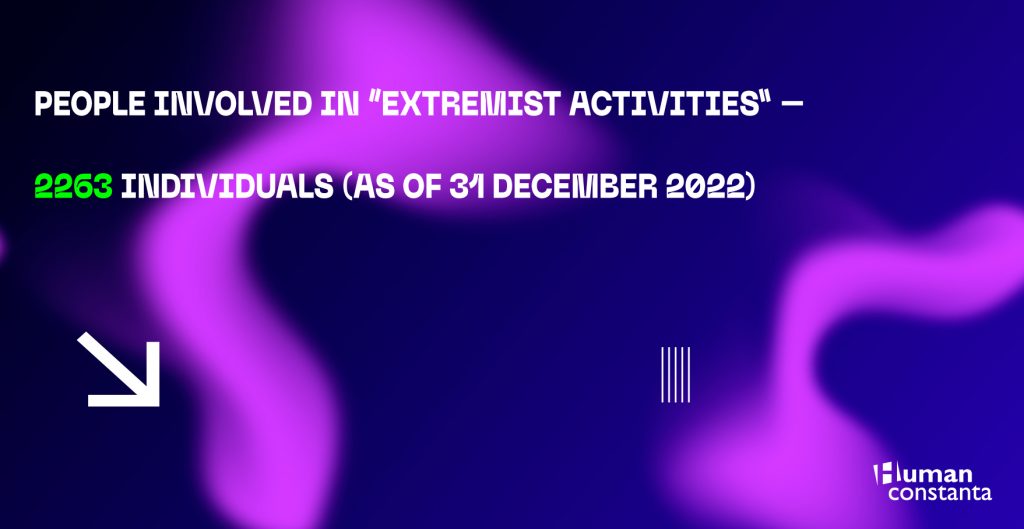
The List of citizens of the Republic of Belarus, foreign citizens or stateless persons involved in extremist activities was first published on March 23, 2022, and since then has been actively updated with hundreds of people against whom a sentence under “extremist” articles has come into force. In October-December, the security forces added 11 times more people to the list than in the previous analyzed three months. At the end of December 2022, there are 2.263 people on this list, 1,690 people have been added to the list over the past three months. In fact, this list is a list of people convicted for “political” reasons, which is officially recognized by the regime and is regularly supplemented. The authorities continue to update list with the people convicted of opposition activities in any form, as well as representatives of civil society: for example, human rights activists Leanid Sudalenka and Tatsiana Lasitsa, heads of non-profit organizations Viktar Fianchuk and Volha Harbunova, journalists Aleh Hruzdzilovich and Aliaksandr Ivulin.
Most of the people are included in the list on the basis of sentences under the “protest” and “defamation” articles of the Criminal Code. As before, the list includes people convicted of crimes, the dispositions of which are not directly included in the Law “On Combating Extremism” as “extremist activity”: articles 295-3 of the Criminal Code (“Illegal actions in relation to objects whose damaging effect is based on the use of combustible substances”), 339 of the Criminal Code (“Hooliganism”), 341 of the Criminal Code (“Desecration of structures and damage to property”) and others. The security forces consider some crimes under these articles to be “extremism,” since, according to their version, they were committed for the motives of inciting enmity. The list is being updated with people both serving sentences and those already at large, but whose criminal record has not been extinguished – they are prohibited from engaging in pedagogical and publishing activities, holding government positions, performing military service, as well as working with weapons, ammunition, explosives and drugs.
Changes to the List of Organizations and Individuals Involved in Terrorist Activities
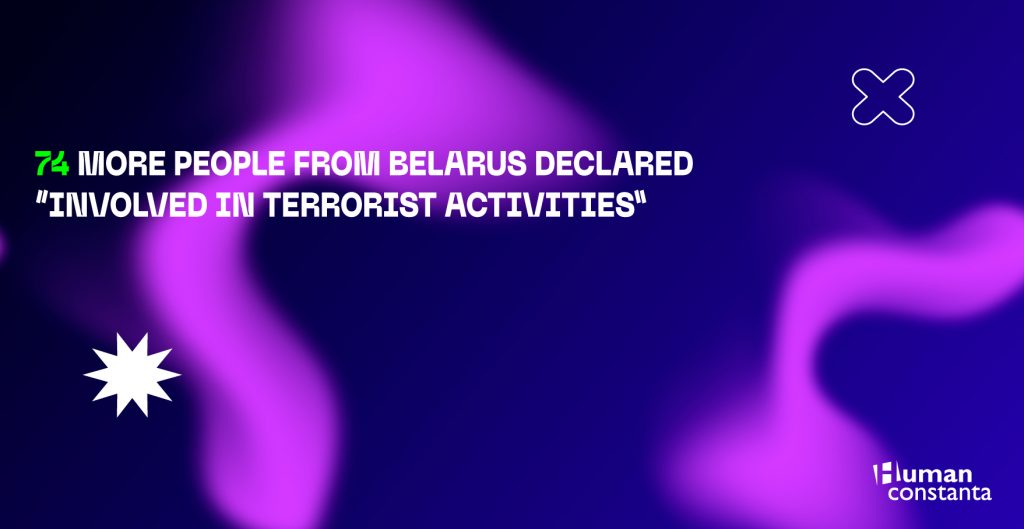
In three months, the KGB included 78 new people in the List, 75 of which are connected with Belarus. The grounds for inclusion in the terrorist list are similar to the “list of citizens of the Republic of Belarus, foreign citizens or stateless persons involved in extremist activities”. As of December 1, 2022, 242 citizens of Belarus were included in the list. Also, there is a Latvian citizen on the list convicted of making negative comments about the Belarusian regime. People included in the list are actually prohibited from any financial transactions.
In addition to people associated with Belarus, three Yemeni Houthis were included in the list based on UN Security Council sanctions lists: a naval commander involved in deadly attacks on international ships in the Red Sea; deputy head of the national security service accused of torturing and attacking aid workers; head of the air force accused of running a program of unmanned aerial vehicles that threaten peace and security in Yemen. Along with the aforementioned people, whose actions really threaten the security of the whole region, the Belarusian authorities include representatives of the Belarusian opposition and civil society in the list.
As before, the basis for inclusion in the list of people continued to appear not only as an “act of terrorism,” but also articles 130 of the Criminal Code (“Incitement of enmity”) and 361 of the Criminal Code (“Calls to harm national security”) – not only people who committed direct resistance actions, but also people who criticized the authorities on the Internet and left negative comments about civil servants. During the analyzed period, in addition to the defendants in the “terrorist cases,” the list was supplemented by:
- defendants in cases of leaking personal data: the leaders of the “Black Book of Belarus” and people who disseminate the data of the security forces;
- representatives of the journalistic community: employees of TUT.BY, journalist Andrzej Poczobut;
- online commentators: defendants in the “Zeltser case” and accused of “inciting enmity” for critical comments;
- political and civil activists: Vadim Prokopiev, Yuryi Ziankovich, Anastasiya Kukhta.
As before, the list included a lot of people who were not previously known to human rights activists. The authorities continue to include the entire families: it includes the Voitekhovich family accused of attacking the house of deputy Gaidukevich.
Disbandment of organizations, website blocking, and preventative flagging for “extremism”
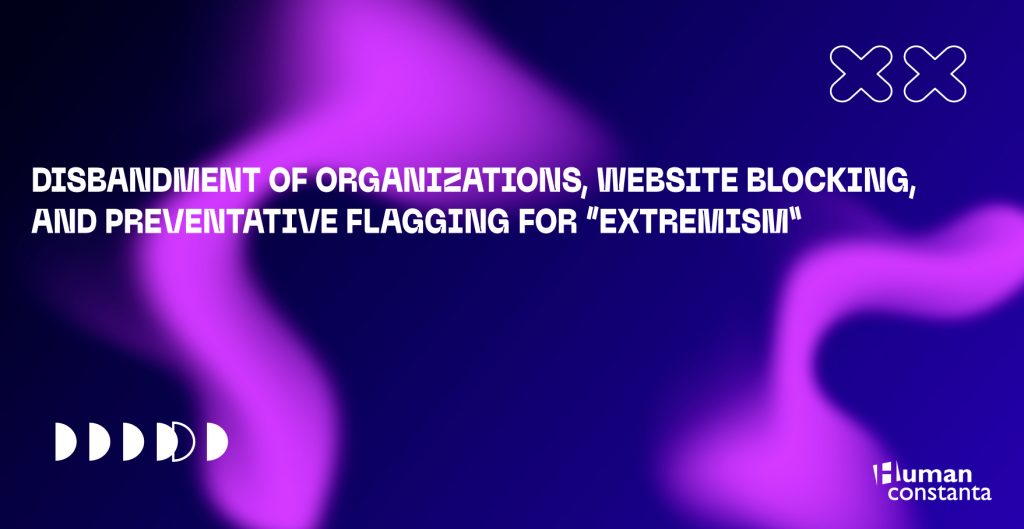
On October 25, 2022, the Minsk City Court disbanded the Viartanne Charitable Foundation, which was engaged in the development of Belarusian culture, education and science. The media claim that the basis for the disbandment was the accusation of the fund’s employees in using “extremist” Telegram channels. On December 13, 2022, the Patreon platform was blocked in Belarus, which allows people to distribute various works on a paid subscription. Probably, the authorities have blocked the platform to prevent “financing of extremism” – it is used to collect donations by many Belarusian initiatives recognized in Belarus as “extremist”. The practice of putting dissidents on a preventive register in places of deprivation of liberty as “prone to extremism” continues – Denis Ivashin, a Novu Chas journalist, has been put on such a register.





